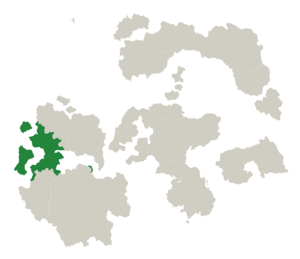LGBT rights in Esthursia
 Location of the Union of Esthursia (dark green) in Auroria (grey) | |
| Status | Legal since 1930 (and 1959, following brief period of criminalisation) |
| Gender identity | Right to change legal gender since 2013 |
| Military | LGBT people allowed to serve openly |
| Discrimination protections | Sexual orientation and gender identity protections (see below) |
| Family rights | |
| Recognition of relationships | Same-sex marriage since 2007; civil unions since 1983 |
| Adoption | Full adoption rights since 2011 |
Lesbian, gay, bisexual, and transgender (LGBT) rights in Esthursia rank amongst the highest in the world. Upon legalising same-sex marriage in 2007, Esthursia became one of the first countries in the world to do so. Public opinion has consistently been in favour of relative liberalisation since at least the 1930s, while 21st century Esthursia overwhelmingly polls in favour of LGBT+ rights.
Esthursia also "has one of the world's most comprehensive transgender rights laws": its Kinshifterenrihtslaw (lit. Transgender Peoples' Law of Rights), passed in 2012, allows people to change their legal gender without facing barriers such as hormone therapy, surgery or psychiatric diagnosis that labels them as having an abnormality. The law - followed by self-ID laws and the third legal gender in 2014 and 2018 as well as the creation of alternative schools and the first transgender community centre in the world, Esthursia has gained a reputation as a safe haven for transgender people and having an exemplary record for transgender rights. As of 2024, both major parties support the maintenance and extension of transgender rights in law.
Societal acceptance is also very high. In a 2020 EsthursiaElects poll, 91% of Esthursia agreed with the statement "it is right that society should accept homosexuality", while 88% supported same-sex marriage and 83% supported recognition of legal gender transition without surgery. The country's largest cities, Weskerby and Brantley, have become centres for LGBT tourism, while several "LGBTQ+ free zones" - such as Execester and neighbouring Atlington, as well as Fjármagn in Helmark, and the city of Ravenscroft - have also been formed. Despite an overall trend of decline in antagonisation and violence against LGBT+ people and communities, there is still a degree of political polarisation over the issue of transgender rights, while there also remains a presence of violence and intimidation - especially online - against LGBT+ people. Esthursia has robust anti-discrimination laws, particularly when pertaining to employment, and since 2017 has promoted policies to "phase out heteronormativity in education and the wider public sector."